Sheikh Mujib as I found him
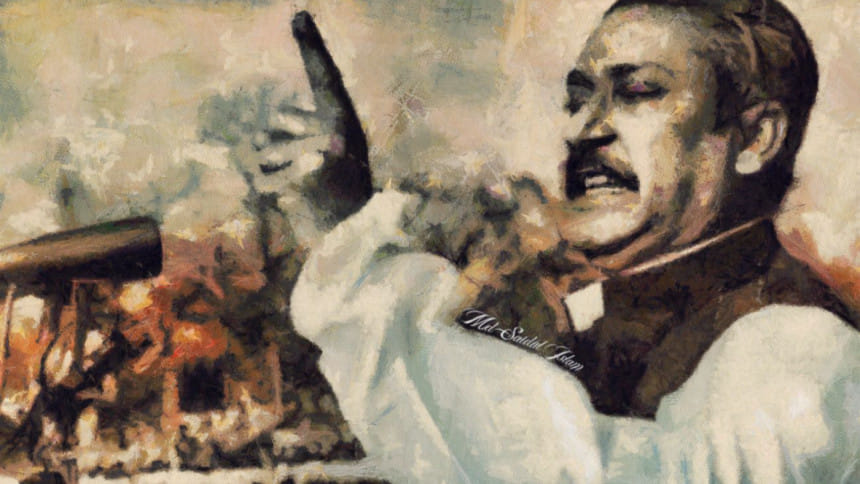
Like those of my age and experience, I can bear witness to some of the major developments in the recent political and constitutional history of the Indian subcontinent. The decline and fall of British rule in India, creation of a secular Hindu-India and a religion-based Muslim-Pakistan. And finally, the emergence of Bangladesh as an independent country.
I was one of those present at the historic Race Course Maidan (now Suhrawardy Udyan) in March 1948 watching and hearing Mohammad Ali Jinnah, the founder of Pakistan, himself sowing the seeds of its destruction by his abortive move to impose Urdu as state language on the majority Bengalis.
Bangabandhu Sheikh Mujibur Rahman's commitment to Bengali independence from the non-Bengali Western rule of hatred and exploitation aroused in his fellow Bengalis an indomitable spirit of liberty and freedom that finally led to our independence. I was fortunate to observe, and be a part of, that memorable journey like many others. I have great respect for Sheikh Mujibur Rahman as a person and admiration for his political leadership and sagacity.
His was a life dedicated to the Bengali interest. He risked his life more than once and suffered many years of incarceration leaving his family in distress.
I had the chance to be close to him on more than one occasion, especially in his days of struggle. In my journalistic career, I had extensively covered his meetings and press conferences including the historic March 7 public meeting. I also covered his election campaign during the 1970 general elections, and also the inconclusive trial of the so-called Agartala Conspiracy Case in which he was an accused.
I particularly remember Sheikh Mujibur Rahman's March 7 speech which is now being acclaimed as one of the best and most memorable speeches ever delivered. It was indeed "a mighty piece of pleading" for his fellow Bengalis, with the sovereign power mostly lying in the then West Wing.
In his speech, Sheikh Saheb was firm and assertive yet seeking reconciliation and peaceful solutions to basic issues between the two wings of Pakistan. He was inclined to a peaceful settlement of political and constitutional issues between the two wings through negotiations (and in fact, later went for negotiation also). He sought peace with the spirit of peace.
However, in its response to the Bengalis' struggle for their rightful political demands, under their elected leader Sheikh Mujibur Rahman, little did the Pakistani ruling circle realise that what is given voluntarily is infinitely greater than what is extracted by force.
Intoxicated by power and inflated by pride and prejudice, the Pakistani rulers could hardly foresee their disastrous future and the victory of their Bengali adversaries. It was a gross failure on their part to not foresee the disaster in the form of the ignominious defeat and surrender of their armed forces on Bangladesh's soil.
This reminds me that in the American fight against the then British sovereign authority, Edmund Burke, the conscience in the British Parliament, had admonished the government to "Behave in such a manner that America realised that the sovereign authority in England is a tower of strength to American Liberty." Burke urged the fellow British, "Uplift your hearts, the vision to realise the reality." He further said, "And remember that a great empire and little minds go ill together."
We feel inclined to think that what Burke had told British government about the then America applied to the Pakistani rulers in respect of the Bengalis.
After all these years, I remember the first time I had seen Sheikh Mujibur Rahman as a rising youth leader. It was in the early 50s, possibly in 1953, when he visited Barisal, my hometown, and spoke at a public meeting at the Town Hall. I was then a student of the local BM College.
But my first meeting with him was in 1954 when he was a member of the East Pakistan Provincial Assembly. My lawyer-politician father BD Habibullah and uncle SW Lakitullah, also a lawyer and politician, were also elected to the then Provincial Assembly.
Once I visited the Assembly to watch its proceedings. My father introduced me to Sheikh Saheb in the Assembly lobby. Sheikh Saheb used to address my father by his nickname as "Badu Bhai", so I could not call him "Mujib Bhai", as most of my journalist colleagues and his party men used to address him. In later years, whenever we met, he would invariably ask, "How is Badu Bhai?" I used to respond, "He is well." And I used to keep silent as I could not call him "Mujib Bhai" in response.
In the course of his election campaign tour of Sylhet for Provincial Assembly polls, after his thumping victory in countrywide general elections for the national parliament, we two journalists, myself and Hassan Saeed, were on board a ferry crossing Shitalakshya. I remember it was a moonlit night. We were having a conversation with Sheikh Saheb when, to our pleasant surprise, he remarked, "You know, the other day your Bhabi was telling me that I am handsome." He recalled his wife's remark about his elegant and handsome features with a kind, approving smile. We replied, "Of course, you are! She has rightly said so." He laughed heartily, "Oh, we all three are handsome!"
During Sheikh Saheb's 1970 election campaign tour, I as a member of the press corps travelled to many places with him. In the course of our journey, we once visited Tungipara, Sheikh Saheb's native village, and his ancestral home there.
The motor vessel carrying us was stationed somewhere close to his village home, a one-storey building of red bricks. Sheikh Saheb went in to meet his parents and other members of his family while the rest of us stayed back to spend the night on board the vessel. We were scheduled to leave for our next destination after an early-morning breakfast.
In the morning, we had a sumptuous breakfast at his home. It was now time for us to leave. Sheikh Saheb's old parents, Sheikh Lutfar Rahman and Sayera Khatun, bade us a touching farewell, asking us to visit again. The most touching part of the farewell was when his mother urged me to pray for her "Khoka". I still remember that rare, emotional moment. As I approached the frail but graceful lady and salaamed her out of respect, she responded by saying, "Baba, you pray for my Khoka." I nodded in response.
Later, after we left the place, I thought to myself, her son as the undisputed leader of his people has reached the zenith of glory—what more could she expect him to achieve? What more is there to pray for? But long after that day, when Sheikh Saheb met his tragic end in 1975, I realised that we humans are always in need of prayer and divine mercy no matter how loved we are and at what stage of life we happen to be.
Amanullah is former Chief Editor of Bangladesh Sangbad Sangstha (BSS) and former Director General of Press Institute of Bangladesh (PIB).




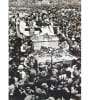
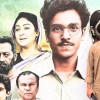
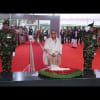

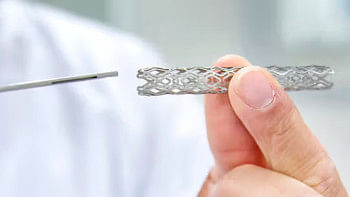
Comments